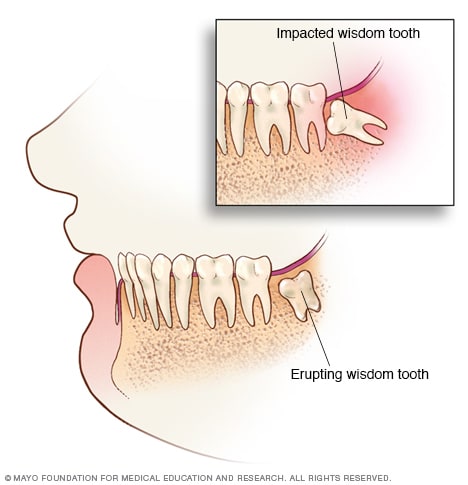Overview
Impacted wisdom teeth

Impacted wisdom teeth
Wisdom teeth are the last of your teeth to appear (erupt) in the mouth. Sometimes a wisdom tooth becomes stuck below the surface of your gums and grows at an odd angle, possibly causing problems. This is called an impacted wisdom tooth.
Wisdom teeth, the third molars at the back of the mouth, are the last adult teeth to come in. Most people have four wisdom teeth — two on the top and two on the bottom. When wisdom teeth become impacted, they don't have enough room to emerge or develop in the usual way.
Impacted wisdom teeth can cause pain, damage other teeth and lead to other dental problems. Sometimes they don't cause any problems. But because wisdom teeth are hard to clean, they may be more prone to tooth decay and gum disease than other teeth.
Impacted wisdom teeth that cause pain or other dental problems usually are taken out. Some dentists and oral surgeons also recommend taking out impacted wisdom teeth that don't cause symptoms to prevent future problems.
Products & Services
Symptoms
Impacted wisdom teeth don't always cause symptoms. But when an impacted wisdom tooth becomes infected, damages other teeth or causes other dental problems, you may have some of these symptoms:
- Red or swollen gums.
- Tender or bleeding gums.
- Jaw pain.
- Swelling around the jaw.
- Bad breath.
- An unpleasant taste in your mouth.
- A hard time opening your mouth.
When to see a doctor
See your dentist if you have symptoms in the area behind your last molar that may be related to an impacted wisdom tooth.
Causes
Wisdom teeth become impacted because they don't have enough room to come in or develop in the usual way.
Wisdom teeth usually emerge sometime between the ages of 17 and 26. Some people have wisdom teeth that emerge behind the second molars without any problems and line up with the other teeth. But in many cases, the mouth is too crowded for proper development of third molars. These crowded third molars become impacted.
An impacted wisdom tooth may partially emerge so that some of the crown is visible. This is called a partially impacted wisdom tooth. If the tooth never breaks through the gums, it's called a fully impacted wisdom tooth.
Whether partially or fully impacted, the tooth may:
- Grow at an angle toward the next tooth, which is the second molar.
- Grow at an angle toward the back of the mouth.
- Grow at a right angle to the other teeth, as if the wisdom tooth is "lying down" within the jawbone.
- Grow straight up or down like other teeth but stay trapped within the jawbone.
Risk factors
Risk factors that can lead to impacted wisdom teeth include lack of space or a blockage that keeps the teeth from emerging properly.
Complications
Impacted wisdom teeth can cause several problems in the mouth, including:
- Damage to other teeth. If the wisdom tooth pushes against the second molar, it may damage the second molar or raise the risk of infection in that area. This pressure also can cause problems with crowding of the other teeth or require orthodontic treatment to straighten other teeth.
- Cysts. Wisdom teeth develop in sacs within the jawbone. The sacs can fill with fluid, forming cysts that can damage the jawbone, teeth and nerves. Rarely, a tumor develops. This type of tumor is usually noncancerous, also called benign. But tissue and bone may need to be taken out due to this problem.
- Decay. Partially impacted wisdom teeth appear to be at higher risk of getting cavities compared toother teeth. This is because the position of wisdom teeth when they are impacted makes them harder to clean. Also, food and bacteria can get trapped easily between the gum and a partially erupted tooth.
- Gum disease. It's hard to clean impacted, partially erupted wisdom teeth. So you're more likely to get a painful, inflammatory gum condition called pericoronitis (per-ih-kor-o-NI-tis) in those areas.
Prevention
You can't keep an impaction from occurring. But keeping regular six-month dental appointments for cleaning and checkups allows your dentist to watch the growth and emergence of your wisdom teeth. Regularly updated dental X-rays may show impacted wisdom teeth before any symptoms start.
Feb. 01, 2024